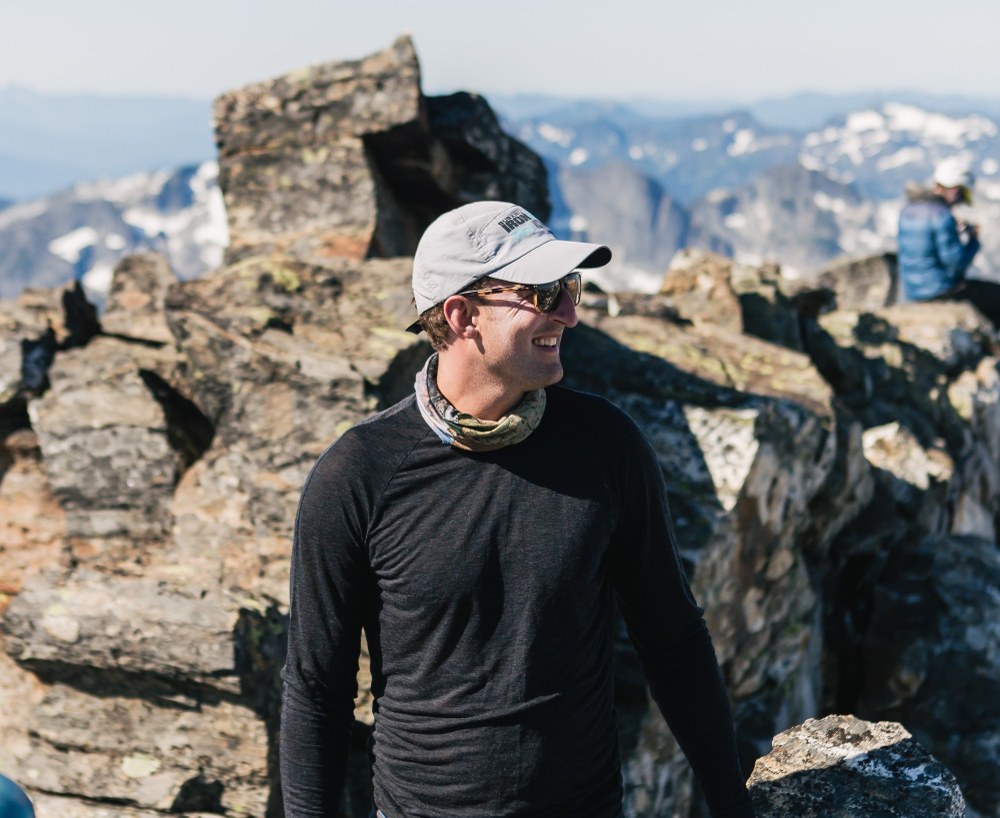
My Mountaineers climbing team is at the summit block of Mt. Olympus, and the clouds are coming in. It’s July 2018, and this is our second climb of the week. My muscles constantly remind me of the miles and elevation I’ve required of them so far, and the distance I still have to go. To finish this ascent we have a short pitch of rock, and we’re doing our best to get up there and see the mythical views before getting completely socked in.
Our climb leader shoots up the 5.3-5.4 pitch, and we take turns belaying as we each move upward, one by one. I’m the third one to summit, and Greg - one of my climbing partners who graduated from the Basic Climbing Course with me - snaps a quick summit picture of me before we’re engulfed in clouds.
“So you’re dating a guy in LA, huh?” He asks. “How’s the constant travelling going?”
On the summit of Mt. Olympus, Greg’s question is an invitation to be openly myself, to share my life with him, and to share this summit in a more meaningful way.
Building connections
A few days prior, most of the Olympus climbing group and I were in the Glacier Peak Wilderness of Snoqualmie National Forest. It was a scorching 90 degrees, there was no wind, and the sun’s glare off the snow was intense. We were in a marmot kingdom, which turned into a hazard when they chewed on gear we didn’t keep an eye on. As we sat around the creek, filtering water for our midnight attempt of Glacier Peak, my tent-mate Kyle made a comment out of nowhere: “I can’t believe you never told me that you’re gay.” There was real emotion in his voice. I couldn’t place if it was anger or pain.
We’d become fast friends the year before, climbing the steep chimney of Mt. Shuksan, and then Mt. Baker a few weeks later. He was from the Midwest and didn’t grow up with access to grand mountain vistas like those of my childhood. His jokes often crossed the line of political correctness; he got in trouble during our mountaineering course for a comment that equated female climbers with sewing circles. His political leanings seemed very different from mine, so I steered clear of any conversation involving them, including my personal life. But we both had competing, hearty laughs, and shared a mutual wonder of the mountain ranges we traversed. Our connection was formed as we sat together with mouths agape, singing their praises.
Even though we had climbed a handful of mountains together, we hadn’t yet had “the talk.” Over the winter, he had learned through social media that I’m gay.
As we sat around the creek with a looming Glacier Peak behind us, I did my best to minimize the importance of his revelation, saying, “Now you know.” My laugh wasn’t the usual hearty heave, it was more timid, but it got the job done, and we changed the subject. However, over the course of the next day he brought it up again and again, dropping the topic into casual conversation and doing his best to get me to open up about it.
Finally, I couldn’t deflect anymore, so on the summit of Glacier Peak, in a sea of Cascade mountaintops, I told him I had a terrible breakup the year prior and didn’t want to talk about it. I tried to convince us both that I wasn’t hiding anything from him. “But you’re my tent partner. I just thought that I should know the guy I’m sleeping next to is gay,” he said. “I mean, you’re my first gay friend. Actually, you’re the first gay guy I’ve ever met.”
I realized in that moment that coming out to someone is not only a process for me - it’s a process for who I come out to as well.
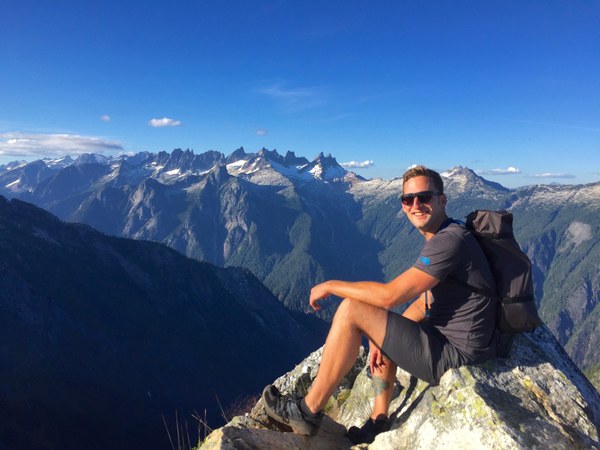 Lance dreaming of the Pickets before he became a climber during a scramble atop Trappers Peak. Photo by Lance Garland.
Lance dreaming of the Pickets before he became a climber during a scramble atop Trappers Peak. Photo by Lance Garland.
Reading the landscape
To manage the dangers of being openly gay in the outdoors, I look for signals from the people I adventure with. A gay slur or an off-color joke can be a sign that my belayer isn’t capable of belaying me and that I should climb carefully in such a person’s presence. While my tent-mate Kyle proved to be open-minded and we became even closer after that conversation, it could have turned out very differently.
Most of the people on my climbs are people who I’ve trained or climbed with before. But in The Mountaineers, we also climb with people we don’t know. We share tents with strangers, as I did on a trip to West McMillan Spire in the Picket Range where I slept in my small two-person tent with a basic graduate from a different branch who I’d met but hours before. We rely on the organization to vet other climbers and vouch for our ability to keep each other safe and alive in the wilderness. We put our trust in The Mountaineers to make sure that we all have, at minimum, the knowledge and skills required for our chosen outdoor sports.
When we climb, for example, we put our lives in the literal hands of our belayer. No one wants to be belayed by someone who makes them feel unsafe, whether that’s physical or emotional safety. For minorities in the outdoors, and for me as an openly gay man, we look for a belayer who has the basic knowledge and support needed to be a part of a climbing team where minorities like us are allowed to take up space.
This adds to our community network and connects us with other people like us, so that we can have experiences like the one I had with that stranger from my McMillan Spire climb, who turned into a friend as we climbed into the mountain range that was a shared, longstanding dream.
Checking for bias
People have a lot of preconceptions about gay lives. They judge us by their experience and by what society has ingrained in them. I recently wrote an essay for Outside Online about being an openly gay firefighter and outdoorsmen, and while there were parts of me that thought it wasn’t an important story to tell, some of the responses I received validated its usefulness.
Many supportive people rallied around my message and lifted up my voice, and for that I remain profoundly grateful. One of the most poignant was a man from Colorado, an aspiring climber and firefighter, who has dreamed of doing the things I have done, but as his authentic self. After reading my story, he wrote me an emotional email and told me that for the first time in his life he felt that someone in the public realm represented who he was and who he wanted to become. He wrote about how he knew all too well the fears and anxieties of being openly gay in places where there aren’t many others living openly. The fear often immobilized him and held him back from pursing his passions. He wrote about how my openness inspired him to live his dreams and to follow his heart.
And yet there were others.
Some of the most common knee-jerk responses were from individuals trying to invalidate my perspective. People said the essay was a useless bit of journalism and must have been a slow day for the publication. People said that society has long since gotten past the issue of gay people. They ask, “Who cares if you’re gay in the outdoors?” They ask, “How exactly is one gay outside anyway? Are you sashaying up the mountain with a pink feather boa? Get over yourself and stop being a victim.” Others verged on the precipice of open hostility.
As a writer, I can’t expect to please everyone when I put myself out there. The vulnerability of writing brings with it a lot of criticism, oftentimes cruel, but I share these comments to show the white-hot center of the topic.
The response touched on a sad truth that there are still places where being openly gay in our society is a reason for ridicule, if not outright hostility. I try not to focus on these facts, but when they show up in your inbox and as comments for anyone to read, you can’t just forget about them.
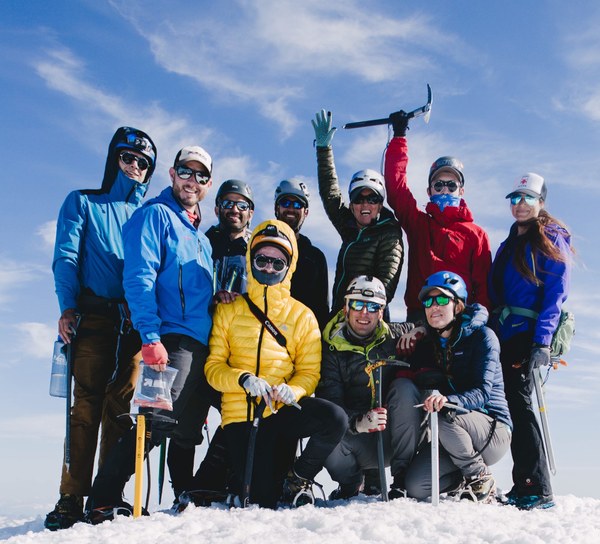 Lance’s climbing team on the summit of Glacier Peak. Photo by Kimber Cross (@kimberbelle).
Lance’s climbing team on the summit of Glacier Peak. Photo by Kimber Cross (@kimberbelle).
Visible and invisible hazards
For many minorities, their difference is visible. People process their bias against visible minorities quickly and often before any interaction has taken place. Many queer people can signal their differences with clothing or other visible cues, but for people like me, we “pass” for straight people. Passing is a concept where a minority can fit into a normative environment without being seen as different. For me, as a white man who has little visible cues to indicate my sexuality, I pass until I come out to my peers.
Coming out as queer can certainly mean wearing a feather boa and sashaying along a trail for some people, but for me, being openly gay in the outdoors is when I am my authentic self, open to sharing my life with those outside with me. It is a move away from fear and toward trust in my fellow humans.
But coming out comes with its own set of obstacles.
When I come out to someone, there is a moment when I see their reaction written on their face and in their body language. Because I pass, when I come out to someone I get to witness, in real time, their processing of the new information. Often in this moment I go from being part of the team - of straight white men - to instantaneously becoming an outsider, someone who is not on the same level, someone who is less-than. Oftentimes in this moment I am relegated to being more like a woman, which has given me new insight to the injustices of sexism.
I can come out to someone through words, and I can come out to someone through actions. In my Outside article, I became a visible gay man when I was kissing my boyfriend in our tent and a stranger walked up and was clearly shaken by the sight. Coming out to strangers carries the threat of hostility and even violence, even if it doesn’t always end with such things. For many young people, coming out to family can bring with it ostracism and homelessness. Some estimates state that 40% of homeless youth are LGBT. As a firefighter in downtown Seattle, I see this disproportionate percentage play out in the course of my day-to-day duties.
Being openly gay in the outdoors isn’t a political statement, but can get turned into one by people who haven’t accepted that they share space in nature with people different from them. These same people who talk about their wives and husbands; their date nights and their marriages and their kids. They come out to the world as straight without ever thinking of that as “coming out” because it is a common thing and is greeted without judgment. They are openly themselves because society hasn’t ever made them believe that being openly themselves is a political statement or something that people can use to judge them or make them feel unsafe. They’ve never had to censor this part of themselves. They’ve never had to try to pass as homosexual in order to survive.
I live in a world where my sexuality is constantly elevated to being the most important thing about me. This happens to most gay people, and it’s an obstacle for us. In my ideal world I would go about my business and live a “normal” life, or one that passes for normal. In a lot of ways I have that option available to me because I can pass and could choose to do so. It would certainly make my life easier in so many ways.
But instead of going to great lengths to hide my relationship status, instead of being sure not to touch my fiancé in outdoor spaces, of keeping my private life private from my friends, and of constantly censoring myself and my wardrobe, I choose to be open to the world and the outdoor community around me.
By doing so, I step into the political realm where my identity can be consumed by peoples’ bias and their beliefs. Some people feel like they have a say in my life, as if their judgment is enough to censor or silence me. This is a part of our history, but in today’s society, the value we place on love and freedom has made this a thing of the past - mostly, anyways.
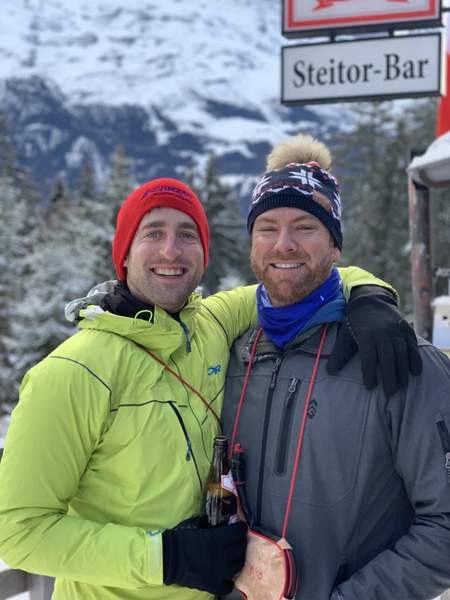 Lance (left) and Oliver on the slopes of Grindelwald, Switzerland, a few days after Oliver proposed. Photo provided by Lance Garland.
Lance (left) and Oliver on the slopes of Grindelwald, Switzerland, a few days after Oliver proposed. Photo provided by Lance Garland.
Building a new trail together
The Mountaineers has become a place I call home. On one of my recent climbs with The Mountaineers - West McMillan Spire - I had the great honor of climbing with an openly gay climb leader. Like my tent-mate on that climb, I didn’t know the climb leader before the trip either, but on the first stretches of trail we talked about married life, of his husband and their years-long journey together, and my new adventure with my fiancé and how we will exchange vows next summer in Whistler.
Knowing that people like me have been outside climbing for years, openly living out their mountaintop dreams as their authentic selves, is a wonderful thing.
As we scaled the loose shale of West McMillan Spire, surrounded on all sides by distant mountaintops, we made it to the top of our first peak in the Pickets. With the full range of the Southern and Northern Pickets in our sights, and Luna Peak to our northeast, we made a decision to climb together again next year, and to continue our exploration of the legendary Pickets range we’d collectively dreamed of. And we were each going to do it as our authentic selves.
I feel it important to keep speaking my truth, so that we continue to engage a world that fosters inclusivity and openness. This is something that doesn’t just happen, and it is something that needs to be reinforced by people of all walks of life. We do this by listening to each other, by truly hearing what the other has to say about their experience. We do this by supporting each other in ways that builds on our similarities as well as learning how to navigate our differences. We do this by being open.
When we talk about our lives, and when we share our perspectives, we talk about important things. Everyone deserves to speak their truth. Everyone deserves a place to call home. Everyone deserves to feel safe in that space. And everyone deserves access to nature.
If I had my way, I wouldn’t be writing so much about my sexuality. Being gay wouldn’t be a reason to have the spotlight on me. My actions, like climbing Olympus and Glacier and West McMillan, would be the heart of the story. But I’ve spoken up, and will continue to do so, because I know all too well what it’s like to live in the shadows, isolated and lonely and without a community of similar people around me. While I’ve somehow carved out a place for myself as an open individual today, I’m writing this for my younger self - for that man in Colorado who dreamed big dreams - and for all the others out there who are looking for proof that they can succeed in the world as their authentic selves. I’ve done it. This story is proof, and I want to encourage you to do the same. Live your outdoor dreams with openness and as your authentic self knowing that the more you do so, the more fulfilling and freeing your life will be.
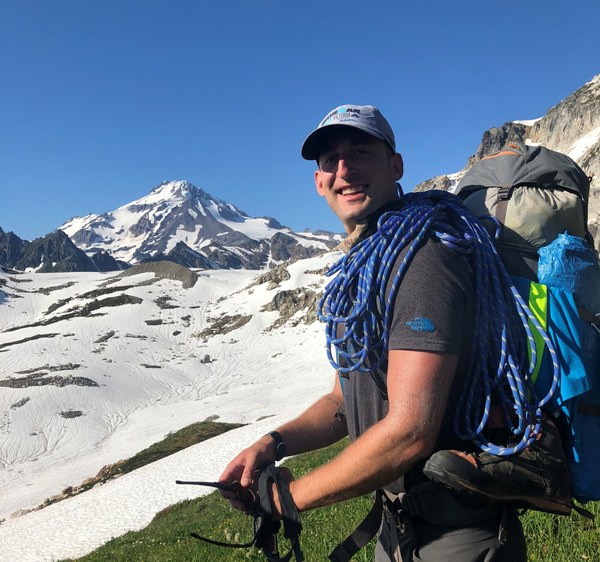 Climbing toward Glacier Peak in July of 2018. Photo by Kimber Cross (@kimberbelle).
Climbing toward Glacier Peak in July of 2018. Photo by Kimber Cross (@kimberbelle).
This article originally appeared in our Spring 2020 issue of Mountaineer Magazine. To view the original article in magazine form and read more stories from our publication, visit our magazine archive.
Add a comment
Log in to add comments.Thanks for sharing this! You're a fantastic writer as well.
 Lance Garland
Lance Garland